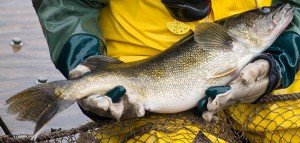 Anglers in the area are never far from a lake where they can catch Minnesota walleye; fish stocking keeps it that way.
Anglers in the area are never far from a lake where they can catch Minnesota walleye; fish stocking keeps it that way.
Stocking Minnesota walleye involves taking eggs from waters that have reproducing walleye populations and releasing newly hatched fry or small Minnesota walleye fingerlings into lakes that don’t have reproducing populations.
The Minnesota Department of Natural Resources pays for its stocking effort with fishing license and Minnesota walleye stamp dollars. This year, the process started April 8 in the Pike River near Tower, used eight egg-take sites and ended April 26 in Fergus Falls.
Here’s a snapshot of the stocking stats:
2015 stocking effort
- Eggs taken: 4,655 quarts of eggs, or 582 million eggs, close to the 10-year average.
- 2015 stocking plan: 286 rearing ponds get 115 million fry and 272 lakes get 296 million fry. The goal for fingerling stocking is about 140,000 pounds.
General walleye stocking stats
- Length of a Minnesota walleye fry: about 1/3-inch.
- Length of a Minnesota walleye fingerling: 4- to 6-inches.
- Lakes stocked with Minnesota walleye (each lake usually every other year): about 1,050, all over the state.
- Lakes where, without any stocking, anglers could still catch walleye: 260, mostly in the northern half of the state.
- Estimated percentage of walleye harvested in Minnesota that result from natural reproduction: 85 percent, with about half from popular walleye lakes like Lake of the Woods, Leech, Red and Winnibigoshish.
- Cost of an easy way to support Minnesota walleye stocking: $5, to buy a walleye stamp, sold wherever Minnesota hunting and fishing licenses are sold.
Stocking other fish
The MN DNR also rears and stocks catfish, muskellunge, lake sturgeon and northern pike using 11 warm-water hatcheries; and stream trout, lake trout and splake in five cold-water hatcheries. To provide youth fishing opportunities in numerous Twin Cities metro area lakes, the agency stocks bluegill, channel catfish, crappie, largemouth bass, northern pike, perch and Minnesota walleye.
For stocking information about individual lakes, enter the lake name on LakeFinder at the DNR Fish Minnesota page.